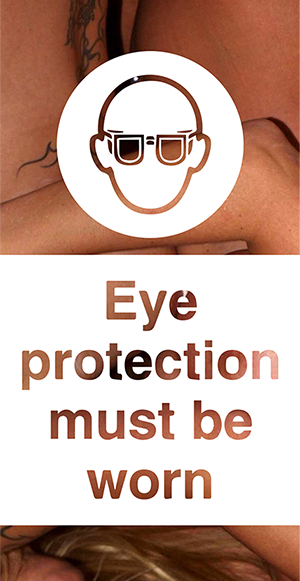L.A.'s Unenforceable Porn Condom Law
The prophylactic police reach a "stalemate" in the courts, but regulators aren't giving up yet.


Good news for Americans with a fetish for safety goggles: If certain California activists get their way, we could be seeing a lot more of them in erotic videos, along with more condoms and dental dams. While Los Angeles County and the porn industry are at a legal deadlock over a county condom requirement, barrier protection in porn is now set for a statewide vote in November.
The L.A. law, known as "Measure B," was approved by voters in 2012 and has been embroiled in legal challenges ever since. Constitutional lawyer Paul Cambria Jr. and his colleagues are representing porn giant Vivid Entertainment in its lawsuit against the Los Angeles County Health Department.
Measure B's two main mandates are that porn performers must wear condoms for scenes involving sexual intercourse and that adult filmmakers must apply for public health permits. Sold by the AIDS Healthcare Foundation (AHF) as a way to protect porn actors from HIV, the adult film industry says it's both unnecessary—current industry screening standards for HIV and other sexually transmitted diseases work just fine—and unconstitutional.
Both a U.S. district court and the 9th Circuit Court of Appeals rejected Vivid's argument that the condom law violates the First Amendment. "We agree with the district court," wrote appeals Judge Susan P. Graber in December 2014, that "whatever unique message plaintiffs might intend to convey by depicting condomless sex, it is unlikely that viewers of adult films will understand that message."
But the decision wasn't all bad news for the industry. Graber affirmed the lower court's choice to enjoin several key provisions of Measure B, including stipulations that noncompliant production companies could have their permits taken away and a provision related to searches and seizures. "Given that adult filming could occur almost anywhere, Measure B would seem to authorize a health officer to enter and search any part of a private home in the middle of the night, because he suspects violations are occurring," District Judge Dean Pregerson wrote in his decision. "This is unconstitutional because it is akin to a general warrant."
So what does that mean for the measure? While "the condom requirement is still there, there's no mechanism there to either grant or take away a permit or whatever," explained Cambria during a January 20 panel discussion at Adult Video News' 2016 Adult Entertainment Expo, the industry's annual trade show and awards ceremony. "It's a stalemate" on enforcement at this point.
The state can still go after filmmakers under California's occupational safety rules. The California Department of Industrial Relations, known as Cal/OSHA, states in its blood-borne pathogen standards that employers must "protect workers from serious diseases including HIV, hepatitis B and hepatitis C, which can be transmitted through exposure to blood and other potentially infectious materials." Cal/OSHA has interpreted this to mean that porn performers must wear condoms.
But the agency's heart doesn't seem to be in enforcement, observes Karen Fuller Tynan, a California lawyer who specializes in adult-industry cases. Though Tynan's been busy recently defending porn production companies cited by Cal/OSHA, the agency only began investigating and prosecuting companies for condom violations after loud complaints from AHF. Recently Tynan helped one client settle with the agency for $685—down from an initial attempt to fine the company more than $20,000 for "lack of barrier protection" in a film scene.
Tynan also represented porn company Evil Angel, but this time there was no settling. Cal/OSHA offered, she said, but Evil Angel founder and owner John Stagliano declined. The case went to trial, but "halfway through the first morning in the trial Cal/OSHA dismissed everything related to condoms. They couldn't prove their case. And I think we ended up getting cited for an air compressor." (Disclosure: Stagliano is a donor to Reason Foundation, the nonprofit that publishes reason.)
"That case really showed Cal/OSHA that we'll take it to the mat, that certain companies are not going to be pushed around," Tynan said at the same AVN panel.
On February 18, the Cal/OSHA Standards Board will hold a public hearing on the use of condoms and other barrier-protection methods, such as dental dams, in porn films. They will also consider a requirement that porn performers wear safety goggles "if you can reasonably anticipate anything in the eyes," Tynan explained, "in addition to tons of record-keeping [requirements] that probably violate every kind of privacy law."
Meanwhile, supporters and opponents of mandatory condoms are gearing up for a new battle, as a law similar to L.A. County's will appear on California's statewide ballot in November. AHF President Michael Weinstein is leading the charge for The California Safer Sex in Adult Film Act, which would mandate condom use for all on-camera intercourse and also, depending on particulars, require things like dental dams and safety goggles; impose a fine (up to $70,000) for each barrier-protection violation, along with fines of $1,000 to $15,000 for failing to file the proper paperwork for each filming; and force all porn production companies to get a special state license. It would also allow any California resident to file a lawsuit against an adult film company if he or she notices no condoms being used. And it would make Weinstein the state porn czar, tasked with investigating and prosecuting non-compliant companies.
Weinstein and AHF also have their targets set on passing condom measures in Nevada and Florida, Tynan added. "He wants to be the sheriff of porn town," she said. "He really wants to get rid of us, and wants to rule us."
This article originally appeared in print under the headline "L.A.'s Unenforceable Porn Condom Law."


Show Comments (27)